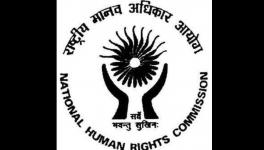New NHRC Advisory Recognises Sex Work as Work, Addresses Key Women’s Issues
In a major victory for women’s rights in India amid the COVID-19 pandemic, campaigns led by several advocacy groups have resulted in the National Human Rights Commission (NHRC) issuing fresh advisories to states.
The NHRC advisory on the rights of women, in the context of COVID-19, was issued on October 8. It was based on impact assessment done by experts. The NHRC had constituted a “Committee of Experts on Impact of COVID-19 Pandemic on Human Rights and Future Response” in order to assess the impact of the pandemic on the realisation of the rights of the people, especially the marginalised sections of society. The advisory addresses important issues for women workers like Accredited Social Health Activists (ASHA), Anganwadi workers, migrant and unorganised workers, adolescent girls and women in prisons.
Sex Workers in “Women at Work” Section
One of the major takeaways from the advisory is the recognition of sex work as informal work, thereby enabling sex workers to access rightful benefits. The National Network of Sex Workers (NNSW) had submitted six pages of recommendations to the NHRC expert committee. The commission has recognised and included most of the recommendations given by the network group of 19 organisations across India.
The NHRC recognised that the brunt of the unemployment in the country is being disproportionately borne by the informal sector – with meagre wages, lack of food and water – and called for stronger state support. The advisory highlighted that the major proportion of this bracket comprised women, also sex workers, who face stigma, as the nature of sex work demands physical contact, which is to be avoided during the pandemic. HIV positive sex workers are unable to access anti-retroviral therapy, which is essential for their survival and many sex workers are outside the purview of government schemes as they lack identity documents.
Speaking to NewsClick, Ayesha, from the National Network of Sex Workers, said: “This is a beginning for us; there is a lot more that needs to be done, however, the recognition of migrant sex workers remains crucial as we seek shelter and work where conditions are safe for us. We are hoping that the notification will have some effect on the ground. It was a difficult battle for us.”
The advisory addressed issues of domestic violence as well, with such cases witnessing a two-and-a-half fold increase between February and May. The NHRC recommended a “coordinated and inter-ministerial health system response” to gender-based violence and a task force to ensure the implementation of related laws.
On the Accredited Social Health Activists (ASHA), anganwadi and sanitation workers, the advisory said their remuneration should comply with minimum wage standards and overtime work should be compensated. For women from Scheduled Castes, Scheduled Tribes and minority communities, the advisory said essential healthcare services, COVID-19-related or not, should be uninterrupted.
The advisory said the government should notify sanitary napkins and iron folic acid supplements as essential items and ensure their continuous supply through the Rajiv Gandhi Scheme for Empowerment of Adolescent Girls and Rashtriya Kishor Swasthya Karyakram. It added that all pregnant women prisoners should be released and for those inside jails, better washrooms and gender-sensitive health services should be provided.
Speaking to NewsClick, Sarojini N. from SAMA said, “The advisories are significant as they will enable us to set a precedent for the future in terms of policy. The fact that not just pregnant women, but women with infants are also recognised and that care has been mandated for them, is a huge victory.”
“It has been incredibly challenging giventhat women are not a homogenous group. However gender, caste, religion, location, socio-economic status, disability, gender/sexual identities, work and ethnicity are relevant to all advisories. The Advisories and the specific recommendations are very significant and timely. And I hope these will be implemented by the state, Centre and UTs, which is very important,” she added.
Also Read: COVID-19: Trapped in Lockdown, Sex Workers Forced to Depend on Civil Society Assistance
Get the latest reports & analysis with people's perspective on Protests, movements & deep analytical videos, discussions of the current affairs in your Telegram app. Subscribe to NewsClick's Telegram channel & get Real-Time updates on stories, as they get published on our website.
























